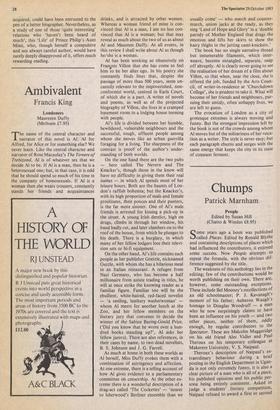Ambivalent
Francis King
Londoners Maureeen Duffy (Methuen £7.95) Maureeen Duffy (Methuen £7.95) rr he name of the central character and
narrator of this novel is Al. Al for Alfred, for Alice or for something else? We never learn. Like the central character and narrator of Rose Macaulay's The Towers of Trebizond, Al is of whatever sex that we decide Al to be. If Al is a man, then he is a heterosexual one; but, in that case, it is odd that he should spend so much of his time in the company of homosexuals. If Al is a woman then she wears trousers, constantly stands her friends and acquaintances
drinks, and is attracted by other women. Whereas a woman friend of mine is con- vinced that Al is a man, I am no less con- vinced that Al is a woman; but that may reveal as much about the two of us as about Al and Maureen Duffy. At all events, in this review I shall write about Al as though he/she is a woman.
Al has been working so obsessively on Fransois Villon that she has come to feel him to be her alter ego. In his poetry she constantly finds lines that, despite the passage of more than 500 years, seem un- cannily relevant to the impoverished, non- conformist world, centred in Earls Court, of which she is a part. A writer of novels and poems, as well as of the projected biography of Villon, she lives in a cramped basement room in a lodging house teeming with people.
Al's life is divided between her humble, bewildered, vulnerable neighbours and the successful, tough, affluent people among whom she moves like an urban guerrilla foraging for a living. The sharpness of the contrast is proof of the author's under- standing of both worlds.
On the one hand there are the two pubs — here called The Nevern and The Knacker's, though those in the know will have no difficulty in giving them their real names — in which Al spends most of her leisure hours. Both are the haunts of Lon- don's raffish bohemia; but the Knacker's, with its high proportion of male and female prostitutes, their ponces and their punters, is the far more sinister. One of Al's male friends is arrested for kissing a pick-up in the street. A young Irish derelict, high on drugs, climbs in through her window, his hand badly cut, and later clambers on to the roof of the house, from which he plunges to his death. There is a burglary, in which many of her fellow lodgers lose their televi- sion sets or hi-fl equipment.
On the other hand, Al's life contains such people as her publisher Goetzle, nicknamed Guzzle, with whom she has a hilarious meal in an Italian restaurant. A refugee from Nazi Germany, who has become a half millionaire from astute trading in titles, he will at once strike the knowing reader as a familiar figure. Familiar too will be the ebullient, white-haired, red-faced novelist — 'a smiling, leathery washerwoman' — whom Al meets for another lunch at the Zoo, and her fellow members on the literary jury that convenes to decide the winner of the Sabine Baring-Gould Prize. Mid you know that he wrote over a hun- dred books standing up?', Al asks her fellow jurors). There are also references, in their cases by name, to two dead novelists, B. S. Johnson and J. G. Farrell.
As much at home in both these worlds as Al herself, Miss Duffy evokes them with a combination of astringency and affection. At one extreme, there is a telling account of how Al gives evidence to a parliamentary committee on censorship. At the other ex- treme there is a wonderful description of a drag-act called 'The Cockettes' — 'nearer to Isherwood's Berliner ensemble than we usually come' — who march and counter- march, union jacks at the ready, as they sing 'Land of Hope and Glory' in a 'double parody of Mother England that drags the emotion and lifts her skirts to show the hairy thighs in the jutting cami-knickers.'
The book has no single narrative thread but innumerable filaments, which inter- weave, become entangled, separate, snap off abruptly. Al is clearly never going to see the realisation of her dream of a film about Villon, so that when, near the close, she is offered the job, funded by the Arts Coun- cil, of writer-in-residence at Thurchdown College', she is prudent to take it. What will become of her friends and neighbours, pur- suing their untidy, often unhappy lives, we are left to guess.
The evocation of London as a city of grotesque extremes is always moving and funny. But the strongest impression left by the book is not of the crowds among whom Al moves but of the solitariness of her voca- tion as a writer. The style is never easy; but each paragraph churns and surges with the same energy that keeps the city in its state of constant ferment.














































 Previous page
Previous page